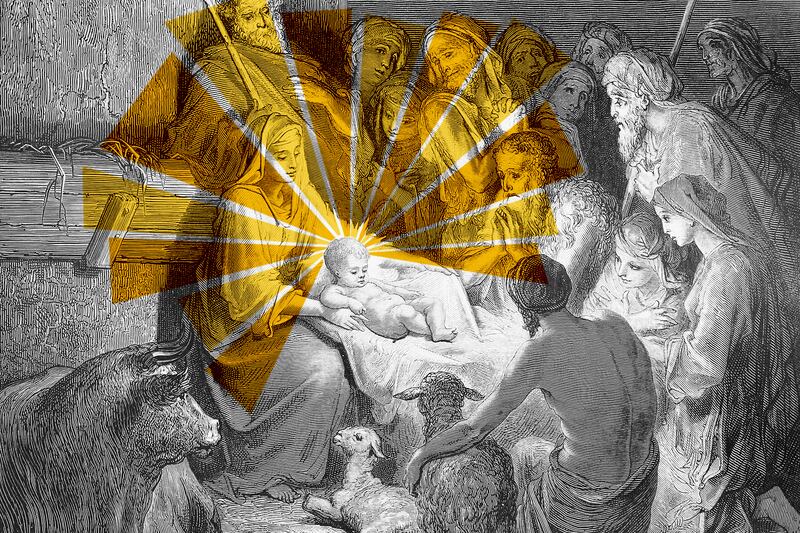This article was first published in the State of Faith newsletter. Sign up to receive the newsletter in your inbox each Monday night.
One of the best parts of my job is that I get to spend a lot of time each week reading articles, watching videos and listening to podcasts from people who are a lot smarter than I am. In doing so, I learn interesting things that become the inspiration for my own work.
For this week’s newsletter, I’m highlighting a few of the fascinating Christmas-related findings that I’ve stumbled upon this month. Read on to discover the complicated history of some of your favorite holiday songs and why the secularization of Christmas is not a new problem.
Nearly all Americans celebrate Christmas, but only around half can confidently retell the biblical story of Jesus Christ’s birth.
New data from LifeWay Research confirms something that I’ve long assumed to be true: Christmas is an incredibly popular holiday in the United States. More than 9 in 10 Americans (91%) say they celebrate it, the survey showed.
If you follow my reporting on the religious landscape, you probably know that far less than 91% of U.S. adults identify as Christian. As of this year, only 63% of Americans identify as Christian, according to Pew Research Center.
It should be no surprise, then, that many people who celebrate Christmas don’t know much about the holiday’s religious significance. LifeWay Research found that 25% of Americans feel they could only give a “quick overview” of the biblical story of Jesus Christ’s birth and that 17% feel they couldn’t describe any of it.
I believe the key lesson from these findings is that Christmas means very different things to different people. Some Americans see it primarily as a chance to celebrate the birth of a religious savior; for others, it’s a chance to spoil loved ones with gifts.
The secularization of Christmas celebrations began (very) long ago.
To more conservative Christians, the idea that some Americans celebrate Christmas as a secular holiday likely feels blasphemous. But I recently learned that it’s not a new phenomenon.
Writing for The Conversation, scholar Thomas Adam explains that, in the U.S. context, Christmas festivities have always had a secular element. Early adopters of traditions like tree-trimming and gift exchanges saw Christmas festivities as a way to unify the country rather than a way to bring more attention to the Bible or the church.
They thought “this holiday tradition provided the emotional glue that could bring families and members of a nation together,” Adam wrote.
The history of your favorite Christmas carols is more complicated than you think.
Just as the history of Christmas celebrations in the U.S. is more complicated than I’d previously imagined, the origin stories for some of my favorite Christmas carols are far more complex than I could have guessed.
I’m learning about the rich histories behind songs like “O Come, All Ye Faithful” by listening to the podcast “Hark!” from America Media. Did you know that the original lyrics for the tune now associated with “Hark! The Herald Angels Sing” were written to celebrate the 400th anniversary of the invention of the printing press?!
My jaw has dropped multiple times while listening to this podcast. I can’t recommend it enough.
Religious Christmas songs aren’t as popular as secular ones.
Speaking of listening, Christianity Today recently investigated which Christmas songs are played the most around the world. The analysis showed that secular hits like Mariah Carey’s “All I Want for Christmas” are generally much more popular than songs like “O Holy Night.”
As my pal Daniel Silliman put it, “Jesus is the reason for the season. But he doesn’t show up much in the top Christmas songs played on Spotify.”
Fresh off the press
Term of the week: 12 days of Christmas
I’ve sang the song “The 12 Days of Christmas” at least once a week for the past year. Why? Because my son’s bedtime routine includes lots of singing and I don’t have that many lullabies memorized.
Despite my many performances of the piece, I didn’t know much about the tradition it describes until I decided to research it this weekend. I was pretty sure that Christmas is the first day (rather than the 12th day) but wasn’t sure why.
What I learned from a great Vox article is that the concept of the 12 days of Christmas comes from Christian theology. It commemorates the time between the birth of Jesus Christ (on Christmas) and the coming of the three wise men, which is celebrated on Jan. 6. Vox noted that “some families choose to mark the 12-day period by observing the feast days of various saints (including St. Stephen on Dec. 26) and planning daily Christmas-related activities” but most do little more than sing the song about an outlandish series of gifts.
What I’m reading ...
As I noted last week, Religion News Service, the Conversation and The Associated Press recently partnered on a project examining women’s roles in faith groups that are traditionally led by males. One of the latest stories in the series focuses on the growing importance of women leaders in The Church of Jesus Christ of Latter-day Saints.
Afghan families working to rebuild their lives in the United States are struggling to find affordable housing, educational services and a sense of community. As you might have guessed, government agencies don’t have all the answers. That’s where religious organizations, among other groups, come in. I really enjoyed World Magazine’s recent look at how Welcome Families, an inter-church initiative that serves Afghan refugees, is helping recent arrivals to the U.S. feel more at home.
Odds and ends
I love most stories about escaped zoo animals. Especially when they involve camels fleeing nativity scenes.
Merry Christmas to those who are celebrating! I am really looking forward to the extra family time.


